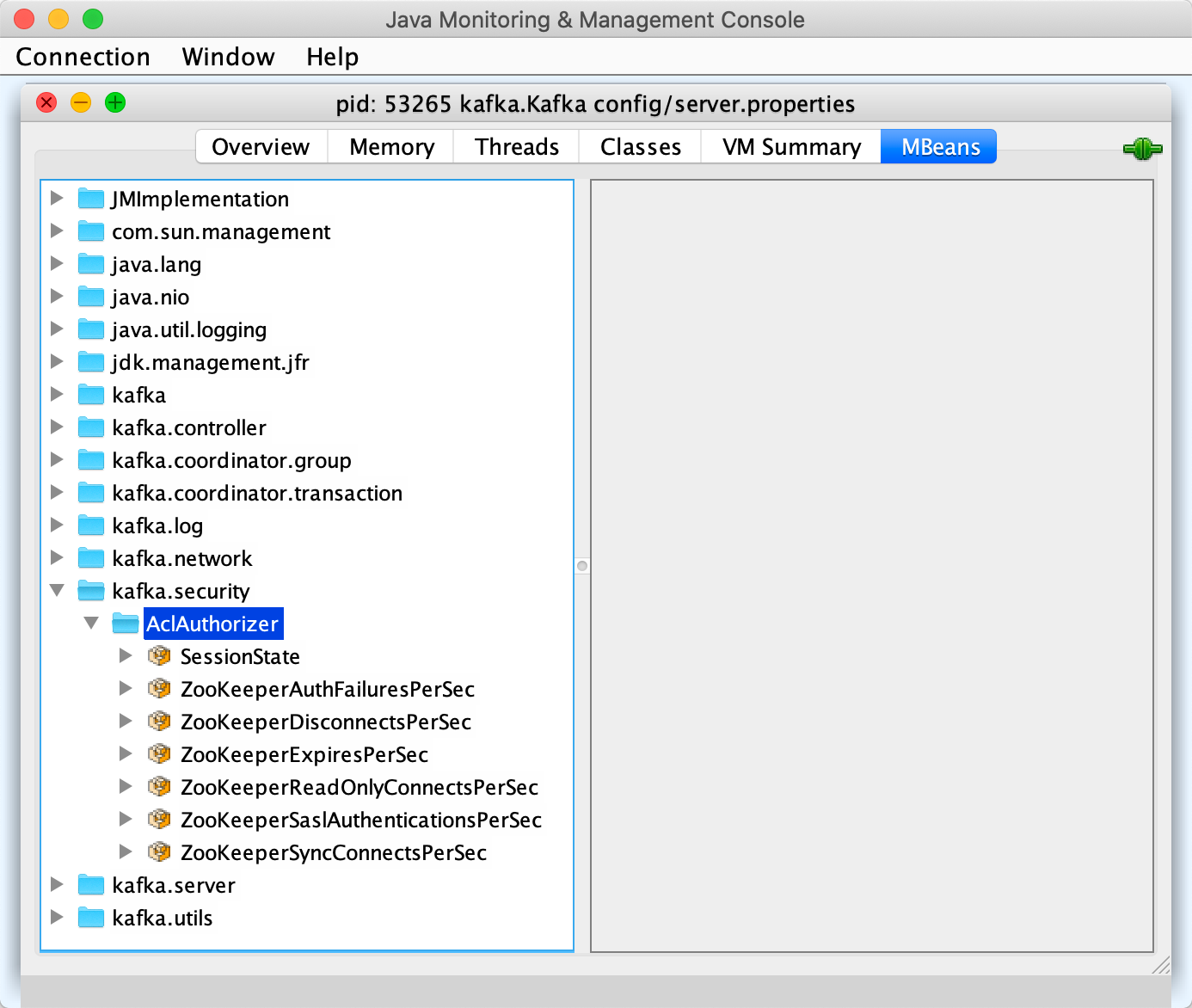log4j.logger.kafka.authorizer.logger=ALLAclAuthorizer
AclAuthorizer (kafka.security.authorizer.AclAuthorizer) is an Authorizer that uses Apache ZooKeeper to persist ACLs.
|
Note
|
AclAuthorizer is available since Apache Kafka 2.4.0 (KIP-504 - Add new Java Authorizer Interface).
|
AclAuthorizer uses properties for configuration (when KafkaServer is requested to start up).
AclAuthorizer may use its own dedicated ZooKeeper for ACLs per authorizer.zookeeper.url configuration property (that could be separate from the cluster’s ZooKeeper).
AclAuthorizer uses a dedicated KafkaZkClient to access ZooKeeper.
|
Tip
|
Consult Demo: ACL Authorization. |
| Name | Description |
|---|---|
|
Allows all users to access resources with no ACL Default: |
|
Default: zkConnectionTimeoutMs |
|
Default: zookeeper.max.in.flight.requests |
|
Default: zookeeper.session.timeout.ms |
|
URL of the dedicated Zookeeper to store ACLs (that can be different from zookeeper.connect) Default: zookeeper.connect |
|
Semicolon-separated list of Kafka principals that are super users and have access to all the resources for all actions from all hosts. Default: (empty) |
|
Tip
|
Enable Add the following line to Refer to Logging. Please note that Kafka comes with a preconfigured That means that the logs of |
configure Method
configure(
javaConfigs: util.Map[String, _]): Unit|
Note
|
configure is part of the Configurable contract to pass configurations.
|
configure creates a KafkaZkClient (using the properties in the given javaConfigs) with kafka.security metric group and AclAuthorizer metric type, and ACL authorizer logger prefix.

configure requests the KafkaZkClient to createAclPaths.
configure startZkChangeListeners and then loadCache.
start Method
start(
serverInfo: AuthorizerServerInfo): util.Map[Endpoint, _ <: CompletionStage[Void]]|
Note
|
start is part of the Authorizer contract to…FIXME.
|
start…FIXME
authorize Method
authorize(
requestContext: AuthorizableRequestContext,
actions: List[Action]): List[AuthorizationResult]|
Note
|
authorize is part of the Authorizer contract to…FIXME.
|
authorize…FIXME
createAcls Method
createAcls(
requestContext: AuthorizableRequestContext,
aclBindings: util.List[AclBinding]): util.List[_ <: CompletionStage[AclCreateResult]]|
Note
|
createAcls is part of the Authorizer contract to…FIXME.
|
createAcls…FIXME
deleteAcls Method
deleteAcls(
requestContext: AuthorizableRequestContext,
aclBindingFilters: util.List[AclBindingFilter]): util.List[_ <: CompletionStage[AclDeleteResult]]|
Note
|
deleteAcls is part of the Authorizer contract to…FIXME.
|
deleteAcls…FIXME
acls Method
acls(
filter: AclBindingFilter): lang.Iterable[AclBinding]|
Note
|
acls is part of the Authorizer contract to…FIXME.
|
acls…FIXME
isSuperUser Method
isSuperUser(
principal: KafkaPrincipal): BooleanisSuperUser…FIXME
|
Note
|
isSuperUser is used when AclAuthorizer is requested to authorizeAction.
|
authorizeAction Internal Method
authorizeAction(
requestContext: AuthorizableRequestContext,
action: Action): AuthorizationResultauthorizeAction…FIXME
|
Note
|
authorizeAction is used when AclAuthorizer is requested to authorize.
|
aclsAllowAccess Internal Helper Method
aclsAllowAccess: BooleanaclsAllowAccess is positive (true) when…FIXME
isEmptyAclAndAuthorized Internal Helper Method
isEmptyAclAndAuthorized(acls: Set[Acl]): BooleanisEmptyAclAndAuthorized is positive (true) when the given acls are empty and the shouldAllowEveryoneIfNoAclIsFound internal flag is positive. Otherwise, isEmptyAclAndAuthorized is negative (false).
isEmptyAclAndAuthorized prints out the following DEBUG message when positive:
No acl found for resource [resource], authorized = [shouldAllowEveryoneIfNoAclIsFound]AclAuthorizer and KafkaZkClient
zkClient: KafkaZkClientzkClient is a KafkaZkClient that is created and requested to createAclPaths when AclAuthorizer is requested to configure.
AclAuthorizer uses the KafkaZkClient for the following:
startZkChangeListeners Internal Method
startZkChangeListeners(): UnitstartZkChangeListeners…FIXME
|
Note
|
startZkChangeListeners is used when AclAuthorizer is requested to configure.
|
loadCache Internal Method
loadCache(): UnitloadCache…FIXME
|
Note
|
loadCache is used when AclAuthorizer is requested to configure.
|
updateResourceAcls Internal Method
updateResourceAcls(
resource: Resource)(
getNewAcls: Set[Acl] => Set[Acl]): BooleanupdateResourceAcls…FIXME
|
Note
|
updateResourceAcls is used when AclAuthorizer is requested to createAcls and deleteAcls.
|
updateAclChangedFlag Internal Method
updateAclChangedFlag(
resource: Resource): UnitupdateAclChangedFlag…FIXME
|
Note
|
updateAclChangedFlag is used when AclAuthorizer is requested to updateResourceAcls.
|